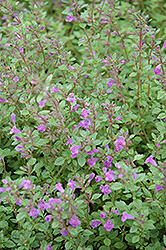>> Home
Height: 12 inches
Spread: 10 inches
Sunlight:
![]()
Hardiness Zone: 5a
Other Names: Alpine Calamint
Description:
This alpine plant is perfect for rock or alpine gardens and particularly hot spots in the garden; attractive, dainty little flowers on a mat of foliage; attracts pollinators to the garden
Ornamental Features
Rock Thyme features dainty violet tubular flowers at the ends of the stems from mid to late summer. Its tiny round leaves remain green in colour throughout the season.
Landscape Attributes
Rock Thyme is an herbaceous perennial with a ground-hugging habit of growth. Its relatively fine texture sets it apart from other garden plants with less refined foliage.
This is a relatively low maintenance plant, and is best cleaned up in early spring before it resumes active growth for the season. It is a good choice for attracting bees and butterflies to your yard. It has no significant negative characteristics.
Rock Thyme is recommended for the following landscape applications;
- Mass Planting
- Rock/Alpine Gardens
- Border Edging
- General Garden Use
- Groundcover
- Container Planting
Planting & Growing
Rock Thyme will grow to be about 12 inches tall at maturity, with a spread of 10 inches. Its foliage tends to remain dense right to the ground, not requiring facer plants in front. It grows at a medium rate, and under ideal conditions can be expected to live for approximately 10 years. As an herbaceous perennial, this plant will usually die back to the crown each winter, and will regrow from the base each spring. Be careful not to disturb the crown in late winter when it may not be readily seen!
This plant should only be grown in full sunlight. It prefers dry to average moisture levels with very well-drained soil, and will often die in standing water. It is considered to be drought-tolerant, and thus makes an ideal choice for a low-water garden or xeriscape application. It is not particular as to soil pH, but grows best in poor soils. It is somewhat tolerant of urban pollution. This species is not originally from North America. It can be propagated by division.
Rock Thyme is a fine choice for the garden, but it is also a good selection for planting in outdoor pots and containers. Because of its spreading habit of growth, it is ideally suited for use as a 'spiller' in the 'spiller-thriller-filler' container combination; plant it near the edges where it can spill gracefully over the pot. Note that when growing plants in outdoor containers and baskets, they may require more frequent waterings than they would in the yard or garden. Be aware that in our climate, most plants cannot be expected to survive the winter if left in containers outdoors, and this plant is no exception. Contact our experts for more information on how to protect it over the winter months.
